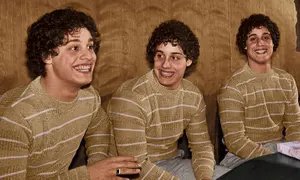 Eddy, David and Bobby were triplets born to a teenage single mother in 1961, and their mother, who was unable to take care of the boys at the time, gave them up for adoption. They were each adopted separately, and the parents were not told that there were two more babies.
Eddy, David and Bobby were triplets born to a teenage single mother in 1961, and their mother, who was unable to take care of the boys at the time, gave them up for adoption. They were each adopted separately, and the parents were not told that there were two more babies.
In 1980, Bobby went to university, but people were treating him weirdly. They kept saying: “Eddy! Eddy, welcome back!” and patting him on the back. When Bobby got to his dorm room there was another person in there – his roommate – and this person knew something was up. He was Eddy’s best friend, and could tell the subtle differences between the two. He took Bobby out to a telephone box and rang Eddy, then they hopped in a car and drove all the way to his house.
They spent hours asking each other questions. They sent their story to newspapers, and they got the front cover story. One day, a man called David rang Eddy’s mum, and said: “I’ve just see the story on the front page, and it feels like I’m looking at myself. I… I think that there’s a third.”
He later states that he thought she ‘almost dropped the phone’.
They went on every TV show, news programme, and even cameoed in a film with Madonna. They opened a restaurant called Triplets, and everything went well, until a journalist discovered a study that the brothers were part of. 8 sets of twins and triplets were separated at birth and studied as they grew up, in the hope of answering the question ‘nature or nurture?’. He contacted the triplets, who said they ‘remembered the men’, the men were the people studying the brothers who told their parents that it was a normal study of adopted kids.
Angry, their parents went to the adoption agency and asked why the brothers were separated and why the adoption agency didn’t tell them there were triplets. The adoption agency said they didn’t think that parents would want triplets. Bobby’s dad said: “We would’ve taken all three.” They left the agency without answers.
Sadly, all the brothers suffered from mental health issues and although Bobby and David recovered, it sadly caused Eddy to commit suicide.
For a more in-depth, interesting account of this incredible story watch the documentary Three Identical Strangers.
By Izzy, Year 7
 We asked teachers from Chantry Middle School about their career choice and maybe it could inspire you.
We asked teachers from Chantry Middle School about their career choice and maybe it could inspire you.
Our first teacher was Miss Mackenzie, head of Year 7…
What inspired you to become a teacher? My own school teachers inspired me and when I got older, I realised that I can do that too.
Did you struggle with your degree? Surprisingly, I quite enjoyed my degree.
What do you enjoy most about your job? I love seeing a student get excited in lessons and the transformation of seeing the individuals grow not just in height but in confidence. When they do stuff like assembly, BBC News Reports and Student Council.
Mrs Young, a science teacher answered our questions…
What was your favourite subject at school? Obviously science. I quite enjoyed PE and Music too.
Do you ever regret becoming a teacher? No.
Doing your degree, did you ever had second thoughts? It was hard but I actually transferred university from Derby to Newcastle to be closer to home but I didn’t give up
We then went to our music teacher Mr Todd…
Are you enjoying Chantry? Yes.
What is it like teaching every class? I’m used to it because there is usually only one music teacher per school. It is stressful though.
What inspired you to become a teacher? I always loved music. I was a musician before I taught. My daughter inspired me because I realised I loved teaching her not just music but how to walk, talk and do everything she can do today. I also love it when students are like “I can’t do this” and then I talk to them for a while and then they start to understand it.
We then talked to our Art teacher, Miss Rabey-Wilson…
Why did you become a teacher? I love art and I wanted others to love it too.
Do you do anything art related in your spare time? Yes, I am a professional artist hand have my own studio.
What were your degrees like? Very hard, I studied in London for 4 years and had to study the anatomy of dead bodies.
Who inspires you as an artist? Hokusai because he creates beautifully balanced pieces
We had a chat with the Head of the PE department.
What did you want to be as a kid? A marine biologist.
How did you come to teaching? I started teaching late, I worked at my Dad’s farm and as a rugby coach but I prefered teaching rugby so I thought why don’t I teach PE.
Were your degrees hard? Yes.
Our Languages teacher, Senora Said, we found out that she had quite high hopes…
Which do you prefer, Spanish or French? Español.
Why did you become a teacher? I initially wanted to do something to do with TV like acting. I loved languages as well and I thought, we don’t I put them together. Which came to teaching as I do a lot of songs and acting in my lessons.
Have you ever struggled as a teacher? Yes it was very hard to get back to the rhythm of it after my one year break.
Our final interview was with our Headmaster.
Do you enjoy being a Headteacher? Yes, I like being Head at Chantry especially after I saw how cultural it is in sign2sing.
Is the job stressful? No, I am quite relaxed. But no day is the same.
How come you became a Head Teacher? I wanted to have a bigger influence on the kids so being head was best.
Did you get a degree intending to be a Head Teacher or just a Teacher? Just a teacher, but as I said, as I progressed in my career I wanted a bigger influence on the children.
By Amy and April, Year 7
Today, Jason and I found out about the COCO Charity Foundation. This name stands for Comrades Of Children Overseas, it is a charity that helps children by teaching them about education and supplying them with a safe and a suitable place to learn. Today we were privileged enough to be able to meet a head teacher from a school in Tanzania Oswin, he told us about what he does in an interview:
Hello I would like to begin by asking about how the foundation came about and what it is?
It was founded by steve crom and it is a charity to help children across East Africa.
That’s very interesting, so what kind of income does the charity have and roughly how much is turned into profit ?
£430 thousand is the income and about 45 thousand is kept in reserve.
Well those digits are something,but how does the money get invested into helping children?
We work in partnership with the HOJA Project COCO fund and HOJA direct what is being spent.
How has this foundation helped your school and you?
Well my school has been a “Bagla Dagala” but thanks to COCO it is now a Kubwa school.
I hear from a fellow student that you are an ex-Chantry student.So how did you get into charity work?
I like to help people and was good at Geography so that helped.
Finally, what is your overall opinion about this foundation?
I hope that one day we won’t be needed, but I think that as long as charities have a good cause, it is alright!
They have a brilliant moto of listen, learn, sustain. These people are doing a brilliant job of improving our world. All of the children want to go to school in east africa and they are so grateful. Thank you to Lucy and Oswin who came in and spoke to us!
By Victoria and Jason (7S and 7W)
 If you have ever seen a dog eat, they always eat with their mouths open. This is because studies have shown they have a special set of teeth at the back of their mouths for tearing meat, and they have to use these a bit like garden shears. They are also incapable of moving their jaw from side to side like us and other animals. They have to use their back teeth to tear apart the meat and they eat it in chunks, so they don’t really have to chew as meat is easy to digest.
If you have ever seen a dog eat, they always eat with their mouths open. This is because studies have shown they have a special set of teeth at the back of their mouths for tearing meat, and they have to use these a bit like garden shears. They are also incapable of moving their jaw from side to side like us and other animals. They have to use their back teeth to tear apart the meat and they eat it in chunks, so they don’t really have to chew as meat is easy to digest.
Next time you see a dog eating, notice how they always chew with their mouths open!
By Eva, Year 7
 William Atkins, aged 14, bought some Waitrose free-range duck eggs and wondered if a supermarket egg would actually hatch. So, he placed it in an incubator (which would provide the correct conditions for the egg to grow), and after three days, when he shone a torch on the egg, he could see a heart beating inside!
William Atkins, aged 14, bought some Waitrose free-range duck eggs and wondered if a supermarket egg would actually hatch. So, he placed it in an incubator (which would provide the correct conditions for the egg to grow), and after three days, when he shone a torch on the egg, he could see a heart beating inside!
Then, just three weeks later, William checked the incubator and saw the egg rocking about, then to see that a small beak was pecking through the egg shell! A duckling emerged from the egg and William was amazed.
William Atkins loves anything to do with wildlife, and he had previously tried the same experiment with a quail’s egg, but nothing happened.
I think that it is really cool how a 14 year old could do something like this, because it seemed quite difficult to keep an animal alive, but I wouldn’t advise anyone else to do anything like this, because it may cause harm to the duck and also it would be a waste of eggs!
By Eva, Year 7
 Lawyers are asking for judges to learn the meaning of all emojis.
Lawyers are asking for judges to learn the meaning of all emojis.
Emojis are a new way of messaging and expressing your feelings through a face or image. New emojis are introduced every year and 157 were introduced in 2018. They started off with a simple smile but now there are emojis for nearly everything from transport to flags, to household items they guarantee at least one emoji is useful for every topic/message.
However senior lawyers are thinking that emojis are being secretly used to communicate about illegal or inappropriate topics that they come across day to day. If this is the case they have requested that al court workers, especially judges, are to know the meaning of every emoji. If it works they will be able to catch out criminals and discover what the have been messaging. However the emoji could mean more than one thing and the could be accused of something they never said. Could this work?
By Gabrielle, Year 7
 Car-free zones have started to be introduced in Glasgow. They have been introduced in around seven primary schools. This is part of a trial to improve road safety and bring awareness to young children. Traffic will be banned from certain areas at designated times; this ensures can come to school and leave school safely on foot. Glasgow City Council said introducing this scheme is because they have got complaints about dangerous driving and air pollution.
Car-free zones have started to be introduced in Glasgow. They have been introduced in around seven primary schools. This is part of a trial to improve road safety and bring awareness to young children. Traffic will be banned from certain areas at designated times; this ensures can come to school and leave school safely on foot. Glasgow City Council said introducing this scheme is because they have got complaints about dangerous driving and air pollution.
I think it would make a positive impact if this happened near us as it would reduce air pollution. It also wouldn’t work for those who can’t walk home as they wouldn’t be able to get home after school or get to school.
By Emily, Year 7
 Animal testing is a disgusting process in which animals put there lives at stake to test cosmetics and medicines. Various animals take part including: mice, rats, frogs, dogs, cats, rabbits, hamsters, guinea pigs, monkeys, fish, and birds. 92% is successful on animals but fails on humans meaning their suffering was a waste of time.
Animal testing is a disgusting process in which animals put there lives at stake to test cosmetics and medicines. Various animals take part including: mice, rats, frogs, dogs, cats, rabbits, hamsters, guinea pigs, monkeys, fish, and birds. 92% is successful on animals but fails on humans meaning their suffering was a waste of time.
People do don’t test products on humans as it violates them but why would it not violate animals as well?
Over 100 million animals die each year due to the cruel need of civilians. The test they die for include: Eye Irritancy, Acute Toxicity, Repeated Dose Toxicity, Skin Corrosivity/Irritation, Skin Sensitization, Pharmacokinetics / Toxicokinetics , Metabolism and Dermal Penetration. Many brands and shops have gone cruelty free meaning their products are not tested on animals these shops conclude of body shop, bath and body works, lush and no7. You can also get any vegan makeup too as this has also not been tested on animals. Even with cruelty free shops there are plenty which are and if more people stop buying products tested on animals companies that are cruelty free will increase in numbers dramatically and animal cruelty will decrease.
You can help by funding and donating to rehabilitation centres to give these poor creatures a chance to find joy in life outside of a cage
We interviewed a few members of our class to get their opinion on animal testing they said…
What’s your opinion on animal testing?
I think animal testing wrong and good at the same time it’s good because it helps develop medicine however it amazes me that people have taken innocent lives to do this.
What would be the best way to end this in your opinion?
To be honest I don’t think there will be an end to it as testing on animals is a sufficient way to develop medicines but I don’t see the need on cosmetics and makeup.
Do you think it has affected the way the world is now?
Yes as it could make many animals endagents and even extinct!
Together we can put an end to animal testing…
By Alexandra and Mary, Year 7

